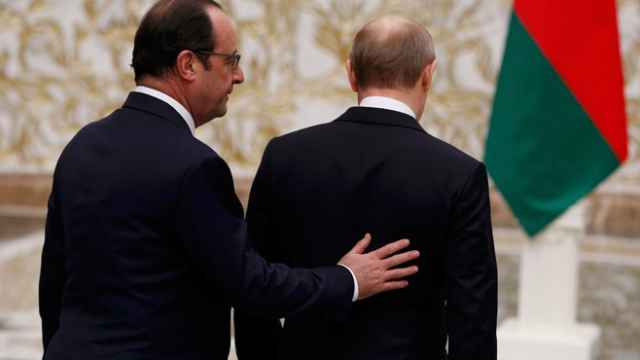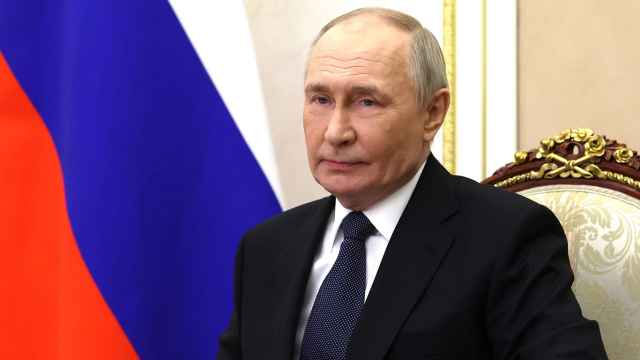John Rose was among the first Americans to come and do business in the former Soviet Union, launching an office of his U.S.-based company in Moscow in 1989 as Russia's first independent advertising and public relations agency.
Today, Rose runs one of Russia's top advertising agencies and public relations firms, counting Coca-Cola, Samsung, Sony, Volvo and other leading global and Russian companies among its clients.
Many of Rose's clients are now cutting costs after sanctions imposed by the West last year over Moscow's actions in Ukraine helped halt Russian economic growth and devalue the ruble by around one-third against the U.S. dollar in the past 12 months.
The Moscow Times sat down with Rose to discuss how the ongoing economic downturn has hit the advertisement and public relations business in Russia and the differences between business here and in the West.
This interview has been edited for length and clarity.
Q: There are cases in Russia when PR is presented in the media as editorial content. How different is this from Western media and how has it evolved in Russia in the past twenty years?
A: In 1988-89, when we first came to this marketplace, the media here had just been let loose. The Soviet government said: "You are on your own. We are not supporting you. Go and earn." Suddenly they had to learn about advertising, which at the time was a completely foreign concept.
Back then the shelves were bare and people waited in line for everything. Any products that made it to Russia were snapped up in minutes. So when Russians learned what I did for a living they would ask me how horrible a product would have to be if we had to advertise it.
A partner of mine at that time met some Russians on a plane. They were from the Moskovskaya Pravda newspaper and had permission to start one of the first magazines in Russia that could accept advertising. They also had no idea what to do. We ended up advising them how to get started. This is how our agency came to Russia.
But in the beginning, the line was completely blurred between advertising and public relations. The media expected companies to pay for news announcements and editorial coverage. Media became so mercenary that in an article I wrote at the time, I joked that if there were a fire, the media would ask for money to report it.
But it shifted very quickly after the first independent media emerged and the industry started to assume international journalistic standards. There are still media that can be paid for editorial content. But today, you cannot really buy your way into quality media. And our agency is not a pay-to-play business. We promote our clients by providing worthwhile content to the media.
Q: How do you rate the effectiveness of PR efforts by government organizations in Russia?
A: I doubt that much serious PR is actually done by government organizations beyond propaganda. There is a certain arrogance here in Russia that officials don't have to persuade people to participate in the political process. Decisions are taken and legislation is drafted regardless of public opinion. They don't run PR campaigns to promote certain social actions or new legislation. Officials don't feel that obligation because there are no consequences for them.
Q: Is there such a thing as bad publicity in Russia? It seems sometimes that Russians pay little attention to bad reputations.
A: There is such a thing as bad publicity for companies. We've dealt with a lot of issues in our 30 years here. Many of them, due to our efforts, you may never have heard about.
Last year, authorities closed several McDonald's outlets. I understand that it may have been political, but at the same time the public starts to believe that they were closed down because of food safety violations and they stop going to other McDonald's restaurants. McDonald's did a fairly good job managing this issue. But I think McDonald's would certainly agree that there is such a thing as bad publicity.
A bunch of young people walked into a Starbucks cafe on the Red Square and threw themselves on the floor, where they lay holding signs claiming they are being poisoned. They said that they had tested the water from ice in the cafe and that there were some harmful bacteria in it. Of course this was untrue. But it was all captured on television. Starbucks issued a statement and created a new, independent water purity test that, of course, proved the water was of above-standard quality. In the end, the people came back to the cafe with flowers to confirm the company was exonerated.
In both these cases, because of their carefully nurtured reputations, the public was unlikely to believe that these companies were guilty of anything. This is why it so important for companies to conduct ongoing public relations programs — so that the public has more to base their opinions on than any singular incident.
Q: What differences do you see between your Russian and international clients?
A: Foreign companies are generally sophisticated and have gained experience from working in many markets. So they know the score. They are sincere, trustworthy and professional. The same can be said for many large Russian companies.
But most Russian companies tend to be autocratic and less likely to delegate decision-making to lower managers. This makes them quicker at making big decisions, but slower at managing day-to-day activities. And, of course, they are far less transparent.
There is also some Russian eccentricity about secrecy. Try phoning a Russian company and asking for the name of one of their executives. The information may even be on their website for the world to see, but the answer on the phone will almost always be "nyet." It always seems strange to me, coming from America where most everyone is far more forthcoming.
Many Russians do not realize the benefits of being transparent, being open to their marketplace and closer to their customers. There really aren't so many secrets worth keeping, outside of product-specific research or design. The biggest differentiator in business and in marketing is the quality of the people and how well programs are executed. Very few businesses owe their success to how well they can keep a secret.
If there is a major difference between Western and Russian clients, it is one of attitude: open versus closed.
Another difference is, perhaps, less understanding by the Russian clients of how advertising and PR work.
Some clients may ask for things to be done that are literally impossible. For example, a client knows that a negative article is about to appear in the media. Usually now it is a pretty balanced story, because most legitimate media observe proper standards. But the article may contain a couple of words that the client doesn't like, even if they are true.
In most cases this should not be cause for panic and we tell such clients not to worry about it. Today there will be a couple of bad words here but tomorrow there will be many great words there. No company is universally loved all the time. But they insist, "no, stop that article." But if the information is accurate, we can't stop the article. That is not one of our superpowers.
Q: How does the current situation affect the public relations and advertising businesses in Russia, particularly those that are foreign-owned?
A: Regardless of whether a business is local or foreign-owned, we all face similar challenges. During times of economic or political turmoil, many clients reduce spending and often re-evaluate their agency relationships. Of course, foreign-owned agencies face additional pressure from the devalued ruble, which has devastated earnings when measured in other currencies.
I would say that the current situation has accelerated trends that were already occurring. There was already a shift away from traditional media, particularly newspapers and magazines, toward search marketing and digital and social media. The focus is more and more on developing great content that educates or entertains consumers versus interruptive forms of communications like conventional ads and commercials.
In addition to the economic downturn, new laws limiting foreign ownership of media and on placement of ads on cable channels have also negatively impacted media and agency businesses. We recently won [as a client] a media brand that was about to enter the marketplace but then had to suspend their plans because of this new legislation.
The biggest challenge we all face is uncertainty. The question is how long will this so-called crisis last? The longer it goes in this direction, the longer it will take to turn things around. Even after the economic crisis ends and there are no rational reasons not to return to the market, there may still be fear that things can go wrong again in Russia, forcing businesses to further postpone decisions.
Q: Are any new opportunities opening up due to the crisis?
A: I think overall the public relations side of our business is an interesting one now. As clients reduce media spending they often turn to other forms of communication like public relations. And just as we have seen during previous crises, even if it is an issue of downsizing the company, it has to be managed from a publicity standpoint.
On the downside, there will be no Russian companies moving into international equity markets any time soon because of their low valuation in other currencies. So there will be less consulting work for us in this sector.
Our traditional advice when working with companies during a market downturn is that brave companies can capture a disproportional share of the market. If you have the resources, you have to "lean in" and become more aggressive with marketing. And you need to be more creative. It takes more than money. It is about using tactical opportunities in PR, in promotion, in digital marketing, in social media.
It's important to capture a bigger piece of the pie now to control a larger market share in the future.
The crisis also creates great opportunities for Russian companies that have struggled against international competitors that may be retreating. Even sanctions are creating opportunities for Russian businesses. A lot of food companies will be able to come up. In the future they will be the new ad spenders. No matter how bleak things look, there is always an opportunity.
Contact the author at n.abdullaev@imedia.ru
A Message from The Moscow Times:
Dear readers,
We are facing unprecedented challenges. Russia's Prosecutor General's Office has designated The Moscow Times as an "undesirable" organization, criminalizing our work and putting our staff at risk of prosecution. This follows our earlier unjust labeling as a "foreign agent."
These actions are direct attempts to silence independent journalism in Russia. The authorities claim our work "discredits the decisions of the Russian leadership." We see things differently: we strive to provide accurate, unbiased reporting on Russia.
We, the journalists of The Moscow Times, refuse to be silenced. But to continue our work, we need your help.
Your support, no matter how small, makes a world of difference. If you can, please support us monthly starting from just $2. It's quick to set up, and every contribution makes a significant impact.
By supporting The Moscow Times, you're defending open, independent journalism in the face of repression. Thank you for standing with us.
Remind me later.







